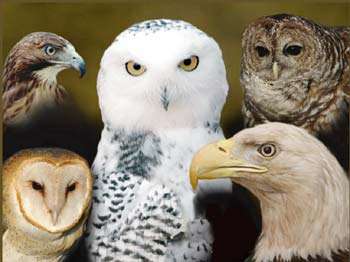Eagle Valley Raptor Center
category : Wildlife Refuges
 Eagle Valley Raptor Center specializes in native Kansas Birds of Prey. These include Eagles, Hawks, Owls, Kites, Falcons and Vultures. The Center feels it an honor to help these animals become independent again and return back to their natural way of life.
Eagle Valley Raptor Center specializes in native Kansas Birds of Prey. These include Eagles, Hawks, Owls, Kites, Falcons and Vultures. The Center feels it an honor to help these animals become independent again and return back to their natural way of life.Since 1998 the EVRC has taken in on average over 100 birds a year due to injuries, poisoning or orphaned as babies. A facility was built that not only would provide a place to care for these birds, but offered an educational opportunity for schools, churches, scout groups, 4-H, seniors and other appropriate organizations to come and learn about these important species to the Kansas environment.
EVRC offers exciting, upclose and personal, private-guided Tours for groups or organizations. Tours are approximately one hour long.
A covered Pavilion, able to seat 50 people, is available for lunches, cookouts or catered dinners. The program will include an educational, up close, out of cage viewing of several of the birds and "touchables" are available for children such as wings, feathers, and talons. Pellets and instructions on what to do with them are also available for science teachers.
Birds that are included in the program are a Great Horned Owl, Barn Owl, Barred Owl, Snowy Owl, Screech Owls, Eurasian Eagle Owl, Red-tailed Hawk, Harris Hawk Golden Eagle and Bald Eagle.
Admission: Tours must be scheduled ahead of time.
Address: 927 North 343rd St West
Phone: 316-540-0003
Our Email: klockwood@eaglevalleyraptorcenter.org
Our Website:www.eaglevalleyraptorcenter.org
How You Can Help.
Birds that have been hit by cars, caught in ice storms, shot, orphaned as babies or any other event that may cause them to become hurt, or too weak to hunt are candidates for the Eagle Valley Raptor Center. These birds are received from the Kansas Department of Wildlife and Parks, US Fish and Wildlife Service, Zoos, Veterinarians, Animal Control and the General Public. We supply these animals with veterinarian care, food, warmth, nutrition and a place to heal and become well enough to be returned to the wild.
In the event you find an injured raptor, always contact a licensed professional. It could be the US Fish & Wildlife Service, Kansas Department of Wildlife & Parks, Animal Control, Local Zoo or a Licensed Rehabilitator such as EVRC.
If you must handle a raptor, first cover the bird with a blanket or towel to reduce the visual stimulation of the bird. Protect yourself with heavy gloves and safety glasses. Gently fold the birds wings into its body with your two gloved hands and firmly lift the bird into a transport container. Injured Birds are quite unpredictable, and you need to be aware of its sharp talons and beak. This could be a cardboard box with a towel on the bottom so it may hold onto something with its feet, a plastic pet carrier will also do. Never use a wire cage. This will damage the feathers and any soft tissue that is exposed. The carrier should be slightly larger that the bird. The less room that the bird has to move, the less likely it will cause more injury to itself.
Do not feed the bird! Chances are it is dehydrated and an attempt to feed it may worsen its condition. Place the bird in a quiet and dark area while awaiting transportation to a rehabber. Keep away from Children, dogs and cats any loud noises. Stress can reduce its chance of recovery.
Come visit us in Kansas, Kansas